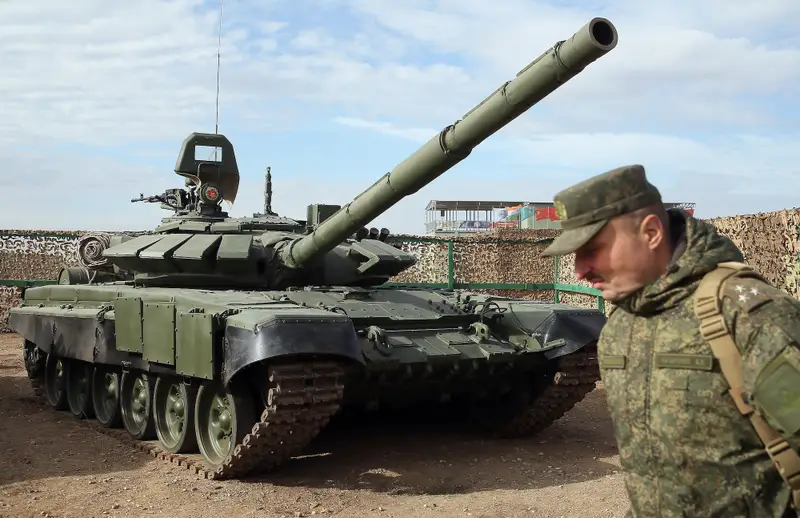According to reports, Morocco has agreed to send T-72 tank parts to Ukraine at the request of the United States. The reports say that the Czech company Excalibur, which extensively modernizes Moroccan T-72s, is sending 90 ‘African’ tanks to Ukraine. The firm has agreed to send 90 ‘African’ tanks to Ukraine as part of a CZK 2.2 billion ($97 million) contract funded by the United States and the Netherlands. According to social media images, the refurbished vehicles are Moroccan. Each tank has improved thermal imaging, night vision, and armor as a result of the refurbishment process.
The United States is the primary supplier of weapons to Morocco, with at least 60 T-72s being in storage. There has been no confirmation from the country, which purchases nearly all of its arms from the United States. American main battle tanks are the most popular. Since Morocco and Algeria have a longstanding conflict, Russia’s close relationship with Algeria may make the kingdom less receptive to its messaging.
Russia has invested heavily in efforts to keep the continent neutral, including the opening of five so-called Russia houses in Africa this fall, which aim to raise the country’s presence, and a constant stream of regime propaganda emphasizing the Soviet Union’s 20th-century assistance for anti-colonial movements.
It is evident why the Kremlin wants to keep this support. Africa has provided fertile ground for Russian arguments in general. At the first UN vote after the invasion, 28 African countries (out of 54) either abstained or did not vote to condemn Russia’s invasion, including Morocco. Only 10 out of 54 African countries backed a resolution to expel Russia from the Human Rights Council in April, nine abstained or were absent, and 35 abstained or were absent. In November, five states voted against a UN resolution that required Russia to pay damages to Ukraine, 27 abstained.
Despite this, Africa has not been indifferent to the battle. Since Ukraine provides the world with a large quantity of basic foodstuff, the battle, and Russian blockades associated with it, were important. Skyrocketing food costs, after all, are a prime factor in revolutions.
According to the United Nations, the world is facing the biggest food crisis in decades. The African Development Bank reported that the price of wheat had risen by 45% in Africa.
The Kremlin began to worry as the repercussions of its actions began to damage its allies. As the New York Times noted, fourteen African nations depend on Russia and Ukraine for more than half of their wheat imports, and Russia and Ukraine were hard hit by sanctions. When the African Union’s president visited Moscow in June, he referred to Putin as ‘dear Vladimir’ and lambasted Western sanctions. A month later, Ukraine was permitted to export grain again.
In addition to maintaining a constant frenzy on the continent, Russia has sent Foreign Minister Sergey Lavrov to emphasize that the war and its repercussions—such as rising food costs—were caused by the West. That concept was endorsed by the son of Ugandan leader Yoweri Museveni, Muhoozi Kainerugaba, who appears to be prepared to succeed his father. On social media, he praised the Russian invasion, stating:
“Putin is right to support Russia’s position on Ukraine since the majority of people (who are not white) agree with him.”
As of 2019, Vladimir Putin has been hosting Russia-Africa summits that welcome over 40 African leaders. In the subsequent year, Russia has become Africa’s biggest arms supplier, and the Kremlin has allowed the deployment of Wagner Group mercenaries to the Central African Republic, Libya, and Mali, where they have been implicated in widespread killings, human rights violations including torture, and questionable resource transactions including gold and oil.
RT, a state-run Russian television network that was formerly known as Russia Today, has been removed from Europe and North America. In June, RT announced that it would open a new office in Johannesburg, South Africa after it was removed from a continent-wide broadcasting platform. Uganda’s television rebroadcasts RT bulletins twice daily, as of July.
According to a study from Brookings, Russian disinformation achieved some success with African audiences on Twitter. They discovered that 78% of tweets about Russia’s war “endorse the notion that Ukrainians are Nazis and/or that Russia is battling Nazism in Ukraine.”
Ukraine has also struggled dhave some Western states having made little headway in countering Russian disinformation. Senior African leaders favored by the Kremlin appear to be unwilling to listen to them. Zelenskyy requested a hearing from the African Union two months in advance and was only able to get four heads of state to attend it.
Because Ukraine was invaded and oppressed by its longtime master, and because Russia triggered an African food crisis, Zelenskyy’s message might have been especially appealing to Africa. “Russia is seeking to annex our country, making Ukraine a Russian colony,” he said to them. His words, nevertheless, were largely neglected.
Continuing diplomatic efforts from the United States are crucial in reversing Russian influence in both Ukraine and the West. As Africa’s importance and economic strength continue to increase, this task will be challenging.
It is important, but much more needs to be done if Morocco’s military assistance is confirmed.
Image credit : Gavriil Grigorov



















